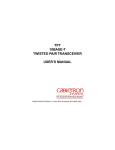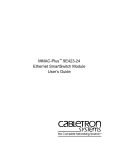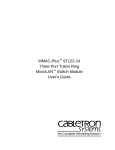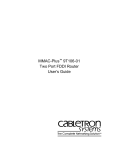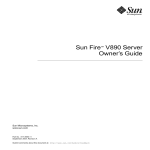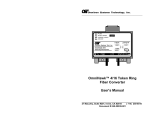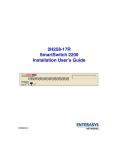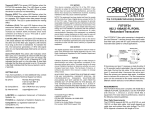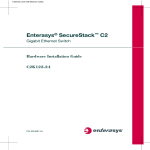Download Cabletron Systems THN-MIM User's Manual
Transcript
COAXIAL MEDIA INTERFACE MODULE (THN-MIM) INSTALLATION GUIDE The Complete Networking Solution™ CABLETRON SYSTEMS, P. O. Box 5005, Rochester, NH 03867-0505 NOTICE NOTICE Cabletron Systems reserves the right to make changes in specifications and other information contained in this document without prior notice. The reader should in all cases consult Cabletron Systems to determine whether any such changes have been made. The hardware, firmware, or software described in this manual is subject to change without notice. IN NO EVENT SHALL CABLETRON SYSTEMS BE LIABLE FOR ANY INCIDENTAL, INDIRECT, SPECIAL, OR CONSEQUENTIAL DAMAGES WHATSOEVER (INCLUDING BUT NOT LIMITED TO LOST PROFITS) ARISING OUT OF OR RELATED TO THIS MANUAL OR THE INFORMATION CONTAINED IN IT, EVEN IF CABLETRON SYSTEMS HAS BEEN ADVISED OF, KNOWN, OR SHOULD HAVE KNOWN, THE POSSIBILITY OF SUCH DAMAGES. © Copyright Feb 1992 by: Cabletron Systems Inc. P.O. Box 5005, Rochester, NH 03867-0505 All Rights Reserved Printed in the United States of America Order Number: 9030034-02 February 92 MMAC, MMAC-8, THN-MIM, LAN-MD, TMS-3, and, Remote LANVIEW are trademarks of Cabletron Systems, Inc. LANVIEW and SPECTRUM are registered trademarks of Cabletron Systems, Inc. i NOTICE FCC NOTICE This device complies with Part 15 of FCC rules. Operation is subject to the following two conditions: (1) this device may not cause harmful interference, and (2) this device must accept any interference received, including interference that may cause undesired operation. NOTE: This equipment has been tested and found to comply with the limits for a Class A digital device, pursuant to Part 15 of FCC Rules. These limits are designed to provide reasonable protection against harmful interference when the equipment is operated in a commercial environment. This equipment uses, generates, and can radiate radio frequency energy and if not installed in accordance with the operator’s manual, may cause harmful interference to radio communications. Operation of this equipment in a residential area is likely to cause interference in which case the user will be required at his own expense to correct the interference. If this equipment does cause interference to radio or television, which can be determined by turning the equipment off and on, the user is encouraged to try to correct the interference by one or more of the following measures: • Re-orient the receiving antenna. • Relocate the equipment with respect to the receiving antenna. • Move the equipment away from the receiver. • Plug the equipment into a different outlet so that the equipment and the receiver are on different branch circuits. If necessary, the user should consult the dealer or an experienced radio/ television technician for additional suggestions. The user may find the following booklet prepared by the Federal Communication Commission helpful: “How to Identify and Resolve Radio TV Interference Problems” This booklet is available from the U.S. Government Printing Office, Washington D.C. 20402 - Stock No. 004-000-00345-4. ii CONTENTS TABLE OF CONTENTS CHAPTER 1 1.1 1.2 1.3 1.4 INTRODUCTION INTRODUCTION ........................................................................ 1-1 USING THIS MANUAL .............................................................. 1-2 SPECIFICATIONS ...................................................................... 1-2 RELATED USER MANUALS ..................................................... 1-4 CHAPTER 2 INSTALLATION 2.1 INTRODUCTION ........................................................................ 2-1 2.2 NETWORK DESIGN GUIDELINES.......................................... 2-1 2.2.1 Thin-net Segments.............................................................. 2-1 2.2.2 Thin-net Segments (THN-MIM7593 only) ........................ 2-2 2.2.3 Thick-net Segments ............................................................ 2-3 2.3 INSTALLATION .......................................................................... 2-4 CHAPTER 3 TESTING AND LANVIEW 3.1 INTRODUCTION ........................................................................ 3-1 3.2 INSTALLATION CHECK-OUT .................................................. 3-1 3.3 USING LANVIEW ....................................................................... 3-2 iii CONTENTS iv INTRODUCTION CHAPTER 1 INTRODUCTION 1.1 INTRODUCTION Cabletron Systems Coaxial Media Interface Module (THN-MIM) provides 12 Ethernet/lEEE 802.3 coaxial cable connectors per module. When used with the MMAC-8™ enclosure, up to 84 coaxial segments can be connected to one MMAC™. The THN-MIM can be mixed with other Media Interface Modules to provide a variety of different media connections. This means that you can use a combination of twisted pair, fiber optic, and coaxial cabling from one MMAC. Each port on the THN-MIM is repeated by the Intelligent Repeater Module (IRM). This feature assures data integrity and maximum data path distance by regenerating and re-timing data packets each time they enter the MMAC. This feature also assures fault isolation since the MMAC will segment problem ports from the network automatically. If a port is segmented, the port will be reconnected automatically to the network once the port has received a valid data packet. Either thick or thin Ethernet cable can be connected to the THN-MIM. Thin-net cable segments, using 50 ohm Ethernet type cable, can be connected directly to the module. Each of these segments can be up to 185 meters in length and can support up to 29 users. Thick-net cable segments made of 50 ohm Ethernet type cable can also be connected to the modules. A BNC to N-Series adaptor must be used to convert the thick-net cable to a thin-net cable. Each thick-net segment can be up to 500 meters in length and can support up to 99 users. If 12 thick-net segments are connected to a THN-MIM, up to 6000 meters of cable supporting 1024 host systems can be attached to that one module. Another model, the THN-MIM7593 is designed for use with 75 or 93 ohm coaxial cable. Thin-net cable segments, using 75 or 93 ohm cable, Page 1-1 INTRODUCTION can be connected directly to the module. Each of these segments supports one device. The entire THN-MIM or each port on the MIM can be controlled via the IRM in your MMAC. The IRM can be accessed directly through a console port on the front panel or be controlled and managed in-band using Cabletron Systems Remote LANVIEW/Windows™, SPECTRUM®, or SNMP compliant network control management software. Each port on the THN-MIM has two LANVIEW® LEDs, the Port OK (POK) LED and the Receive (RCV) LED. The POK LED remains lit as long as the port is connected to the network. If a port is segmented from the network, the LED will not be lit. The RCV LED will be lit when activity is detected on the segment. These LEDs help diagnose physical layer problems as they arise. 1.2 USING THIS MANUAL This manual provides instructions on installing the THN-MIM into the MMAC, attaching coaxial segments to the MIM, and testing those segments after they have been attached to the MIM. This manual assumes that the user has a general working knowledge of Ethernet, and of IEEE 802.3 type data communications networks and their physical layer components. If additional support is needed related to the Cabletron Systems THN-MIM, or if you have any additional comments, improvements, suggestions, or questions, feel free to contact Cabletron Systems Technical Support at: Cabletron Systems P.O. Box 5005 Rochester, NH 03867-0505 Phone: (603) 332-9400 1.3 SPECIFICATIONS Listed below are the specifications for the Cabletron Systems THN-MIM. Page 1-2 INTRODUCTION NOTE: Cabletron Systems reserves the right to change these specifications at any time without notice. BNC INTERFACE (Ports 1-12) Type: BNC receptacle, with gold center contact, for use with BNC type plugs and RG-58 thin-net cable. Internal Transceiver: Cabletron Systems TMS-3 Transceiver. For further information, refer to the TMS-3 Transceiver User's Manual. Terminations: Each segment is internally connected to a 50 ohm terminator in the port. Grounding: Each segment connector shield is internally connected to earth ground by the THN-MIM. This eliminates the need for grounding the segments connected to the BNC ports. INDICATORS POK Indicates that the port is connected to the network. When the module is first installed into the MMAC, the LED will not be lit until the first data packet passes through the port. RCV Indicates that the module is receiving a data packet from that segment. ENVIRONMENTAL REQUIREMENTS Operating temperature: +5 to +40 C Non-operating temperature: -30 to +80 C Operating humidity: 5 to 95% (non-condensing) Page 1-3 INTRODUCTION SAFETY WARNING: It is the responsibility of the person who sells the system of which the THN-MIM will be a part, to ensure that the total system meets allowed limits of conducted and radiated emissions. Designed in accordance with UL478, UL910, NEC 725-2(b), CSA, IEC, TUV, VDE class A. Meets FCC part 15, Class A limits. SERVICE MTBF (MHBK-217D): >156,462 hr. predicted MTTR: <0.5 hr. PHYSICAL Dimensions: 13.4 D x 11.5 H x 2 W inches Weight: 2 lbs. 1.4 RELATED USER MANUALS The manuals listed below should be used to supplement the procedures and other technical data provided in this manual. The procedures contained in these manuals will be referenced, rather than repeated in this manual. • Cabletron Systems TMS-3 Transceiver User's Manual • Cabletron Systems LAN-MD Portable Ethernet Tester User's Manual Page 1-4 INSTALLATION CHAPTER 2 INSTALLATION 2.1 INTRODUCTION The Cabletron Systems THN-MIM is designed for quick and easy installation into an MMAC. No special skills or tools are required to install this module. 2.2 NETWORK DESIGN GUIDELINES The following network design guidelines must be followed when connecting segments to the THN-MIM. If not, unsatisfactory network performance may result. 2.2.1 Thin-net Segments This applies to the THN-MIM only. For the THN-MIM7593, see section 2.2.2. • 50 ohm RG-58A/U type coaxial cable must be used when making up a thin-net cable segment. A 50 ohm terminator must be connected to the far end of the thin-net segment. • A maximum of 30 connections may be made to a thin-net cable segment. These connections must be at least 0.5 meter apart. • For safety, only one end of a thin-net segment should be connected to earth ground. Connection to earth ground at more than one point on the segment may allow for the occurrence of dangerous ground currents. The BNC ports of the THN-MIM are connected to earth ground. This eliminates the need of grounding the thin-net segments connected to the module. • Connections on a thin-net cable segment to host systems or transceivers are made by BNC tee connectors. The male end of the BNC tee connector is used to connect directly to the host or to the transceiver. The female ends of the tee connector must be connected to another part of the segment or to a terminator. Page 2-1 INSTALLATION Since the ports on the module are internally terminated, the end of the segment that will be connected to the module will not be a tee connector or terminator. 2.2.2 Thin-net Segments (THN-MIM7593 only) The following network design guideline must be followed when connecting 75 or 93 ohm coaxial cable segments to the THN-MIM7593. If not, unsatisfactory network performance may result. • The length of the 75 or 93 ohm coaxial cable segment is dependent on signal loss from one end of the cable segment to the other. Signal loss must not exceed 4 db when measured with a 5 MHz sine wave or 6.5 db when measured with a 10 MHz sine wave. • A 75 or 93 ohm coaxial cable segment will only support point to point communication, from one Ethernet device to the THN-MIM7593. No other Ethernet devices are allowed on the segment. • The far end of the 75 or 93 ohm coaxial cable segment must be terminated with a 50 ohm terminator. This will ensure that the Ethernet device on the segment will receive the proper collision detection signal in the event of a collision. • The Ethernet device should be connected as close as possible to the terminator on the far end of the 75 or 93 ohm coaxial cable segment. This will ensure that impedance mismatches due to reflection can be predicted. • The BNC ports of the THN-MIM7593 are connected to earth ground. This eliminates the need for grounding the segment connected to the module. • Impedance mismatches may occur, resulting in signal degradation, due to the 75 or 93 ohm coaxial cable segment being connected to a 50 ohm terminator. This may result in: a. Increased jitter on the segment, ranging from +/-3 to +/-6 ns, depending on the mismatch b. Under certain conditions false collisions may be created. Page 2-2 INSTALLATION • The THN-MIM7593 does not report false collisions to the IRM. However, if a non-Cabletron Systems Ethernet device is connected to the segment, it is possible for false collisions to be generated. Non-Cabletron System devices should be thoroughly tested before using them with the THN-MIM7593. 2.2.3 Thick-net Segments • 50 ohm Ethernet type coaxial cable must be used when making up thick-net cable segments. • Each thick-net cable segment connected to a THN-MIM module must be no longer than 500 meters (1640 feet) in length. When making up networks requiring shorter cable runs, Ethernet standard length 23.4, 70.2, and 117 meter cable sections should be used. These cable sections may be connected together by a barrel connector to form a cable segment. Use of non-standard cable lengths may result in impedance mismatches causing reflections to occur. These reflections may cause data errors. • A 50 ohm terminator must be connected to the far end of the thick segment. • A BNC to N-Series adaptor must be connected to the applicable BNC port to attach the thick-net segment to the module. • A maximum of 100 transceivers may be attached to a thick-net cable segment, and these transceivers must be at least 2.5 meters apart throughout the length of the cable. Transceivers should be placed on the black bands that run along the cable that are marked at 2.5 meter intervals. • For safety, only one end of a thick-net segment should be connected to earth ground. Connection to earth ground at more than one point on the segment may allow for the occurrence of dangerous ground currents. The BNC ports of the THN-MIM are connected to earth ground. This eliminates the need for grounding a thick-net segment connected to the module. Page 2-3 INSTALLATION 2.3 INSTALLATION Install the THN-MIM into the MMAC as follows: CAUTION: Observe all electrostatic precautions when handling the THN-MIM. Static discharges will damage the module. 1. Remove the unit from the shipping box. 2. Slide the two foam end caps off the unit. 3. Remove the unit from the protective plastic bag and set the THN-MIM in a static free area. Save the shipping box and materials in case the module has to be reshipped. 4. Slide the module into the MMAC card cage. 5. Secure the module to the MMAC by turning the knurled knobs. CAUTION: Be sure the THN-MIM is firmly attached to the MMAC by turning the knurled knobs. Failure to do so may result in improper operation. Install the thick or thin-net cable segment(s) to the BNC ports(s) on the module. If a thick-net cable segment is attached to a port on the module, a BNC to N-Series adaptor must be attached to the port. The THN-MIM is now ready for operation. It is recommended that the segments be tested prior to transmitting data. Refer to Section 3.2 INSTALLATION CHECKOUT. Page 2-4 TESTING AND LANVIEW CHAPTER 3 TESTING AND LANVIEW 3.1 INTRODUCTION This section lists procedures to ensure that the segments connected to the Cabletron Systems THN-MIM are operating properly. A description of LANVIEW LEDs and their function in troubleshooting physical layer network problems are also provided. 3.2 INSTALLATION CHECK-OUT This section contains procedures to test that the physical layer of the network and a coaxial segment connected to the THN-MIM are operating properly. This section also contains procedures to check that the physical layer of the network is operating properly. An Ethernet node tester that will generate valid data packets, such as Cabletron Systems LAN-MD, is required for this procedure. NOTE: This procedure should be performed only after testing each segment to verify that the cable lengths, impedance and terminations are within IEEE 802.3 specification limits. For the purposes of this procedure, it is assumed that two Cabletron Systems LAN-MDs are being used. For details on the LAN-MD, refer to the LAN-MD User's Manual. 1. Using a transceiver and an AUI cable, connect a LAN-MD to the segment connected to the applicable BNC port. 2. Select and run test 6 - SERVER. This LAN-MD now acts as a SERVER unit and will act as a packet echoer when used with another LAN-MD. 3. Using a transceiver and an AUI cable, connect another LAN-MD to any other tested segment connected to the MMAC. 4. Select and run test 4 - NODE on the LAN-MD connected in step 3. Page 3-1 TESTING AND LANVIEW At least 100 packets should be sent and received with no errors. The packets will be received from and sent back to the LAN-MD acting as the SERVER. When the applicable segment(s) connected to the THN-MIM have successfully completed these tests, the segments are ready for normal operation. If any failures were noted, please contact Cabletron Systems Technical Support. 3.3 USING LANVIEW The THN-MIM uses Cabletron Systems built-in visual diagnostic and status monitoring system, LANVIEW. A network troubleshooter can quickly scan the LANVIEW LEDs to observe network status, diagnose network problems and identify which node or segment is faulty. The following discusses the function and the purpose of each LANVIEW LED on the THN-MIM. NOTE: There is one Port OK (POK) and Receive (RCV) LED for each port on the module. Port OK (POK) LED When lit, this LED indicates that the port is connected to the network. If the LED is not lit, one of the following conditions exist: a. The occurrence of 33 consecutive collisions on the attached segment or the collision detector was on for more than 2.4 ms., causing the port to be electrically disconnected from the MMAC b. The port was turned off by Local Management c. The port has yet to receive a valid data packet after segmentation or upon power up. Receive (RCV) LED This LED normally flashes on and off to indicate that the MMAC is repeating the data packet. The rate at which the LED flashes will increase as network activity increases. Page 3-2
















